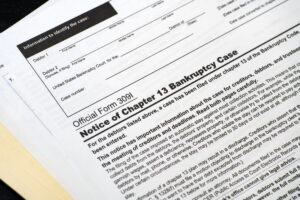
Congratulations! Your attorney has filed chapter 7 bankruptcy petition! Your journey through the bankruptcy process has begun and will be over before you know it.
You just have a few things to take care of.
1. Take the second bankruptcy course.
Everyone who files bankruptcy has to take two classes, one before you file and the other after you file. Usually, these are done online but you can also take them over the phone. You’ll need the case number the bankruptcy court assigned your case in order to take the second class. The certificate of completion needs to be filed within about 75 days after your case was filed. Some providers will file the certificate, for a fee. If you don’t take the second class, the court will close your case and you’ll be forced to pay a large fee in order to reopen your case to have the certificate filed. If the court closes your case because you didn’t file the certificate, you won’t have your debts discharged and creditors can resume collection action. That means they can sue you and garnish your paycheck and bank account.
I’ve had several clients tell me how helpful the second class is. Grab your favorite beverage and electronic device, find a comfortable place to sit, and knock it out.
2. Collect your lawyer bank statements and paystubs.
When you attend the meeting with the trustee, you need to provide bank statements that show how much was in your account on the day your case was filed and all transactions for the 30 days before your case was filed. You also need to provide any bank statements you received after your case was filed. If you have a lawyer, send those documents to her and she’ll forward them to the trustee. If you don’t provide the documents to the trustee, he may reschedule your meeting or even ask the court to dismiss your case.
3. Send the trustee your most recently filed tax return.
You must provide your most recently filed tax return to the trustee seven days before the meeting date. If you haven’t filed your taxes for the current year, send him the last return you filed. Again, if you have a lawyer, give your return to her and she’ll forward it to the trustee. If you don’t provide the return to the trustee, he may reschedule your meeting or even ask the court to dismiss your case.
4. Go to your trustee meeting.
The meeting with the trustee is actually called the meeting of creditors. Personally, I don’t call it that. My clients are already anxious enough about filing bankruptcy. They don’t need more stress. The fact is, very, very few creditors show up at this meeting. I’ve attended close to a thousand of these meetings and creditors have shown up in fewer than 10 of them. Most of them were ex-spouses or attorneys for ex-spouses. Don’t expect to see your credit card company show up. The reality is they don’t need to show up to that meeting to make any objections. Again, objections are very, very rare.
5. Relax.
Take a deep breath. Once your case has been filed, you’ve gone through about 80% of the process. The rest is just doing the above. Naturally, you’ll be anxious about your meeting with the trustee. Don’t be. No one is going to yell at you, scold you, try to embarass you, or accuse you of anything. It’s simply a chance to have you under oath to say that you truthfully provided all the required information. Your lawyer should have prepared you for the meeting and there shouldn’t be any surprises. You’re on your way to a fresh financial start.
Finally, there is one thing I don’t think you should do after you file a chapter 7 bankruptcy: check your credit report. Generally, I tell people not to check their credit report for 90 days after they get their discharge order. It can take awhile for creditors to update the credit report and they may do it more than once before you get your discharge. Be patient. You may be surprised to learn that your credit score can improve by doing nothing. Yes, it will go down when you file. But it will come back up over the next several months, because you have eliminated your late payments and reduced your debt-to-income ratio and your debt-to-credit ratio.
If, after 12 months you’re still not happy with your credit score, you can look into ways to improve your score. One of the most popular tactics is to get a secured credit card.
If you have questions about the bankruptcy process, we hope you’ll schedule a free consultation by clicking here.


